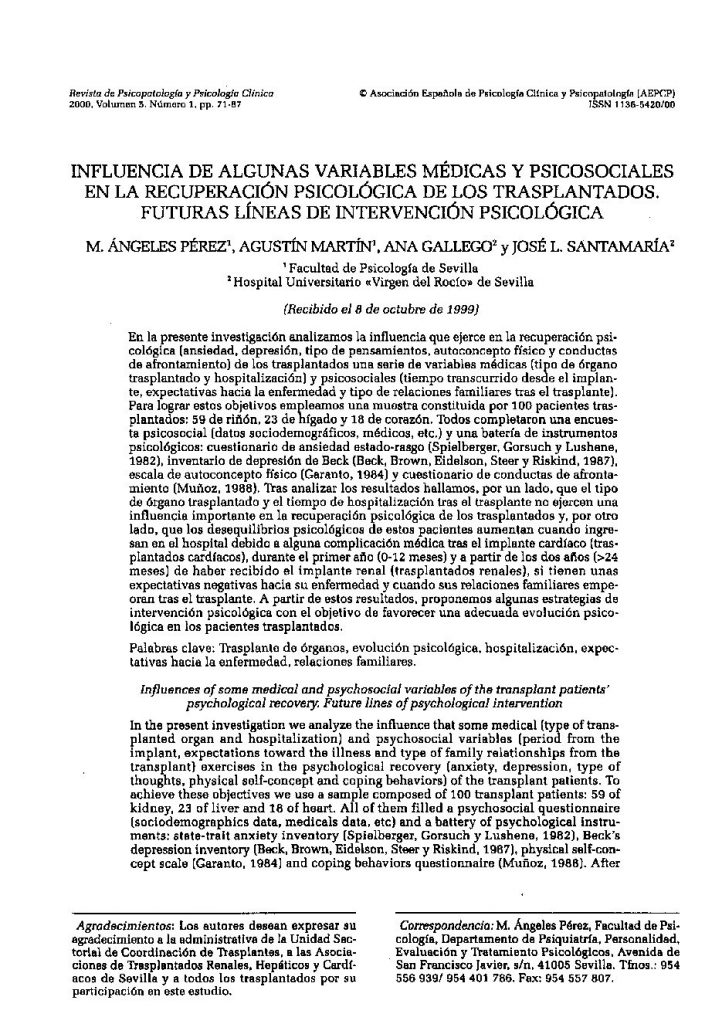Influencia de algunas variables médicas y psicosociales en la recuperación psicológica de los trasplantados. Futuras líneas de intervención psicológica.

- Síntomas de depresión en los adolescentes, estrategias de solución de problemas y educación para la salud comunitaria.
- Prevalencia, dimensiones y vías de adquisición en el miedo a volar en avión.
- Tratamiento del trastorno dismórfico corporal: Una revisión crítica.
- Sintomatología depresiva en escolares de 12 a 16 años y su relación con las distorsiones cognitivas.
- Influencia de algunas variables médicas y psicosociales en la recuperación psicológica de los trasplantados. Futuras líneas de intervención psicológica.
- Isabel Martínez Benlloch y Amparo Bonilla (2000): Sistema sexo/género, identidades y construcción de la subjetividad. Valencia: Universidad de Valencia.
- Constitución de la Comisión Nacional de Psicología Clínica Para la adecuada inclusión de los psicólogos clínicos en el vigente estatuto jurídico del personal estatutario del INSALUD.
In the present investigation we analyze the influence that some medical (type of transplanted organ and hospitalization) and psychosocial variables (period from the implant, expectations toward the illness and type of family relationships from the transplant) exercises in the psychological recovery (anxiety, depression, type of thoughts, physical self-concept and coping behaviors) of the transplant patients. To achieve these objectives we use a sample composed of 100 transplant patients: 59 of kidney, 23 of liver and 18 of heart. All of them filled a psychosocial questionnaire (sociodemographics data, medicals data, etc) and a battery of psychological instruments: state-trait anxiety inventory (Spielberger, Gorsuch y Lushene, 1982), Beck's depression inventory (Beck, Brown, Eidelson, Steer y Riskind, 1987), physical self-concept scale (Garanto, 1984) and coping behaviors questionnaire (Muñoz, 1988). After analyzing the results we find on one hand that the type of transplanted organ and the time of hospitalization after the transplant don't exercise an important influence in the psychological recovery of the transplant patients and, on the other hand that the psychological disorders of these patients increase when they enter in the hospital due to some medical complication after the heart implant (heart transplant patients), during first year (0-12 months) and from two years (>24 months) of having received the renal implant (kidney transplant patients), they have some negative expectations toward their illness and when their family relationships are worse after the transplant. From these results, we propose some strategies of psychological intervention in the order to favour an appropriate psychological evolution in the transplant patients.
En la presente investigación analizamos la influencia que ejerce en la recuperación psicológica (ansiedad, depresión, tipo de pensamientos, autoconcepto físico y conductas de afrontamiento) de los trasplantados una serie de variables médicas (tipo de órgano trasplantado y hospitalización) y psicosociales (tiempo transcurrido desde el implante, expectativas hacia la enfermedad y tipo de relaciones familiares tras el trasplante). Para lograr estos objetivos empleamos una muestra constituida por 100 pacientes trasplantados: 59 de riñón, 23 de hígado y 18 de corazón. Todos completaron una encuesta psicosocial (datos sociodemográficos, médicos, etc.) y una batería de instrumentos psicológicos: cuestionario de ansiedad estado-rasgo (Spielberger, Gorsuch y Lushene, 1982), inventario de depresión de Beck (Beck, Brown, Eidelson, Steer y Riskind, 1987), escala de autoconcepto físico (Garanto, 1984) y cuestionario de conductas de afrontamiento (Muñoz, 1988). Tras analizar los resultados hallamos, por un lado, que el tipo de órgano trasplantado y el tiempo de hospitalización tras el trasplante no ejercen una influencia importante en la recuperación psicológica de los trasplantados y, por otro lado, que los desequilibrios psicológicos de estos pacientes aumentan cuando ingresan en el hospital debido a alguna complicación médica tras el implante cardíaco (trasplantados cardíacos), durante el primer año (0- 12 meses) y a partir de los dos años (>24 meses) de haber recibido el implante renal (trasplantados renales), si tienen unas expectativas negativas hacia su enfermedad y cuando sus relaciones familiares empeoran tras el trasplante. A partir de estos resultados, proponemos algunas estrategias de intervención psicológica con el objetivo de favorecer una adecuada evolución psicológica en los pacientes trasplantados.



